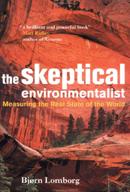 A group of us are studying Bjrn Lomborg’s book The Skeptical Environmentalist. It demonstrates that over the past 200 years our lives have improved greatly, and there is every reason to expect this improvement to continue.
A group of us are studying Bjrn Lomborg’s book The Skeptical Environmentalist. It demonstrates that over the past 200 years our lives have improved greatly, and there is every reason to expect this improvement to continue.
He begins by stating the popular view of our environmental situation, what he calls the Litany. We all know it. The environment is in poor shape — our resources are running out — the population is ever growing, leaving less and less to eat — the air and water are becoming more polluted — the planet’s species are becoming extinct in large numbers, we kill off more than 40,000 each year — the forests are disappearing — fish stocks are collapsing — and the coral reefs are dying. We are defiling our Earth, the fertile topsoil is disappearing, and we are paving over nature, destroying the wilderness, and will end up killing ourselves in the process. The world’s eco- system is breaking down. We are fast approaching the absolute limit of viability, and the limits of growth are becoming apparent.
He was surprised to discover the available evidence does not back up this "Litany," and to realize that he had accepted it. He concluded there must be a doomsday vision anchored in our thinking that can easily lead us into error. What we need is a clear description of the whole world, including the bad and the good, the successes and the failures, and for this we need global statistics. The small part of the world that we see cannot show a balanced picture.
His key idea is that we ought not to let the environmental organizations, business lobbyists and the media be alone in presenting positions. It is important that we do our best to know the real state of the world, most particularly because of the strange and powerful status of environmentalism. The Litany has been so much accepted as the gospel that anyone who disagrees with it is immediately damned. Hence Lomborg, a member of the Left, has been accused of being a messenger for the Right, when all he wants is to present the best possible knowledge. In so doing it is possible he leans a bit far in his arguments. This is not justified by the routine dishonesty of environmentalists, but it is something we need to know.
He suggests that those who give us the negative news are researchers, organizations and the media, and since they are unlikely to change we should take their information with a grain of salt. The Scottish philosopher David Hume wrote "that the humor of blaming the present and admiring the past is strongly rooted in human nature." Sal Baron wrote in his history of the Jews that prophets who made optimistic predictions were automatically considered false prophets. Overcoming this built-in bias requires an effort that all of us are obliged to make.
The rapid growth in population began around 1950 and will end about 2050. "It is not that people suddenly started breeding like rabbits; it is that they stopped dying like flies." The rate of population growth peaked in the 90’s and is dropping now. Food production per acre is increasing. Natural resources, probably including oil, cannot be used up. Air and water are becoming less polluted. Man does not cause much of global warming; best guess is it is the result of solar activity. In 1950 the average woman in the developing countries had 6 children; now she has less than three.
Life and health on this planet have vastly improved, and there is every reason to believe this can continue.




